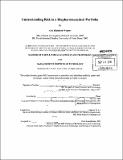Understanding risk in a biopharmaceutical portfolio
Author(s)
Wagner, Alice Elizabeth, 1980-
DownloadFull printable version (5.792Mb)
Other Contributors
Harvard University--MIT Division of Health Sciences and Technology.
Advisor
Fiona Murray and Andrew W. Lo.
Terms of use
Metadata
Show full item recordAbstract
Investors have difficulty funding the life sciences because of the high risks involved in research and development and commercialization of new products. Risk in the biopharmaceutical industry is the result of scientific, regulatory and economic uncertainty. The nature of the biopharmaceutical industry introduces many challenges. Each of these challenges incorporates a measure of risk into drug development. The level of understanding of technical success interdependencies has not been fully investigated. These interdependencies (correlations) could lead to an overall greater risk to the company's portfolio than previously expected. A better understanding of the risks that lead to success or failure in drug development might encourage more investment in the life sciences and specifically in the biopharmaceutical industry, and a greater awareness of the correlations between risks and products might lead to more informed decision making on a biopharmaceutical portfolio leading increased productivity. A dataset was collected from Thomson Reuters. The dataset is the oncology portfolio from a biopharmaceutical company, Genentech Inc. Logistic regression was used to determine if any of the defined variables contributed to the success or failure of the oncology products. The chi-square value was 7.738 with the degrees of freedom equal to 5 and with a p-value of 0.17. Therefore, none of the variables significantly contributed to the outcome. More research should be performed in this area in order to better understand the risk in a biopharmaceutical portfolio.
Description
Thesis (S.M.)--Harvard-MIT Division of Health Sciences and Technology, 2011. Cataloged from PDF version of thesis. "Pages 65-70 contain illegible text. This is the best copy available"--P. after t.p. Includes bibliographical references (p. 63-64).
Date issued
2011Department
Harvard University--MIT Division of Health Sciences and TechnologyPublisher
Massachusetts Institute of Technology
Keywords
Harvard University--MIT Division of Health Sciences and Technology.